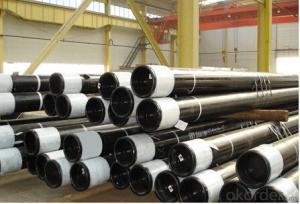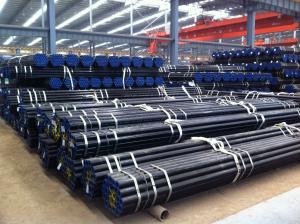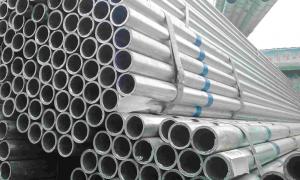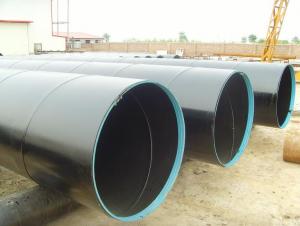Seamless Steel Pipe for Oil Casing Tube factory
- Loading Port:
- China Main Port
- Payment Terms:
- TT or LC
- Min Order Qty:
- 25 m.t.
- Supply Capability:
- 8000 m.t./month
OKorder Service Pledge
OKorder Financial Service
You Might Also Like
1、Structure of Oil Casing Tube:
Oil Casing Tube is formed by drawing a solid billet over a piercing rod to create the hollow shell. As the manufacturing process does not include any welding, Oil Casing Tube are perceived to be stronger and more reliable. Historically Oil Casing Tube was regarded as withstanding pressure better than other types, and was often more easily available than welded pipe.
2、Main Features of Oil Casing Tube:
• High manufacturing accuracy
• High strength
• Small inertia resistance
• Strong heat dissipation ability
• Good visual effect
• Reasonable price
3、Oil Casing Tube Specification:
Standard | GB, DIN, ASTM ASTM A106-2006, ASTM A53-2007 |
Grade | 10#-45#, 16Mn 10#, 20#, 45#, 16Mn |
Thickness | 8 - 33 mm |
Section Shape | Round |
Outer Diameter | 133 - 219 mm |
Place of Origin | Shandong, China (Mainland) |
Secondary Or Not | Non-secondary |
Application | Hydraulic Pipe |
Technique | Cold Drawn |
Certification | API |
Surface Treatment | factory state or painted black |
Special Pipe | API Pipe |
Alloy Or Not | Non-alloy |
Length | 5-12M |
Outer Diameter | 21.3-610mm |
Grade | 20#, 45#, Q345, API J55, API K55, API L80, API N80, API P110, A53B |
Standard | ASME, ASTM |
1) Material:20#(ASTM A 106/A53 GRB.API5LGRB,GB),45#,16Mn,10#.
2) Specification range:OD:21.3-610mm,WT:6-70mm,length:6-12m or according to the requirement of clients.
3) Excutive standards:GB,ASME API5L.ASTM A 106/A53,Despite of the above standards,we can also supply seamless steel pipe with standard of DIN,JIS,and so on,and also develop new products according to the requirements of our clients!
4) Surface:black lacquered,varnish coating or galvanized.
5) Ends:Beveled or square cut,plastic capped,painted.
6) Packing:bundles wrapped with strong steel strip,seaworthy packing.
4、Packaging & Delivery
Packaging Details: | seaworthy package,bundles wrapped with strong steel strip |
Delivery Detail: | 15-30days after received 30%TT |
5、FAQ of Oil Casing Tube:
①How is the quality of your products?
Our products are manufactured strictly according to national and internaional standard, and we take a test
on every pipe before delivered out. If you want see our quality certifications and all kinds of testing report, please just ask us for it.
Guaranteed: If products’ quality don’t accord to discription as we give or the promise before you place order, we promise 100% refund.
②How about price?
Yes, we are factory and be able to give you lowest price below market one, and we have a policy that “ for saving time and absolutely honest business attitude, we quote as lowest as possible for any customer, and discount can be given according to quantity”,if you like bargain and factory price is not low enough as you think, just don’t waste your time.Please trust the quotation we would give you, it is professional one.
③Why should you chose us?
Chose happens because of quality, then price, We can give you both.Additionally, we can also offer professional products inquiry, products knowledge train(for agents), smooth goods delivery, exellent customer solution proposals.Our service formula: good quality+good price+good service=customer’s trust
SGS test is available, customer inspection before shipping is welcome, third party inspection is no problem.
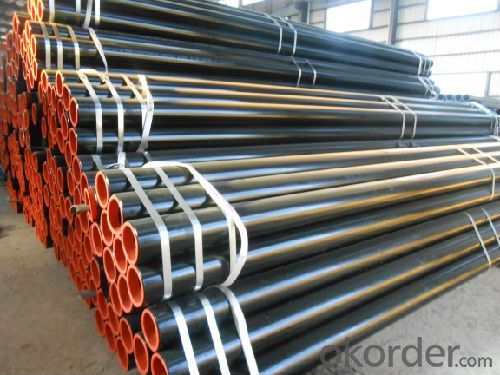
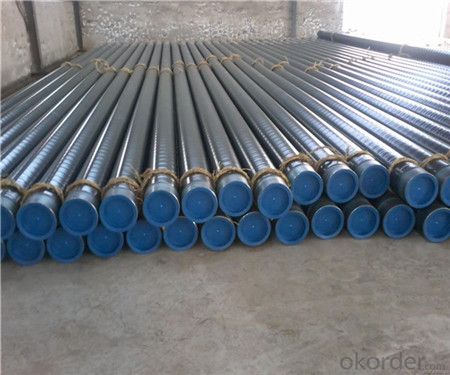
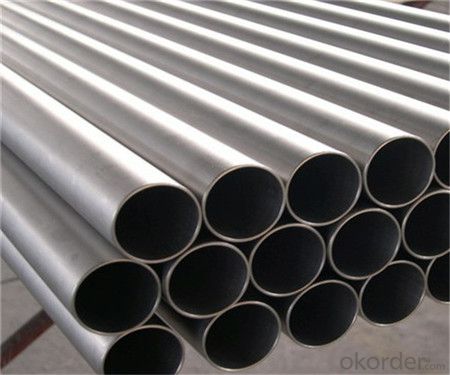
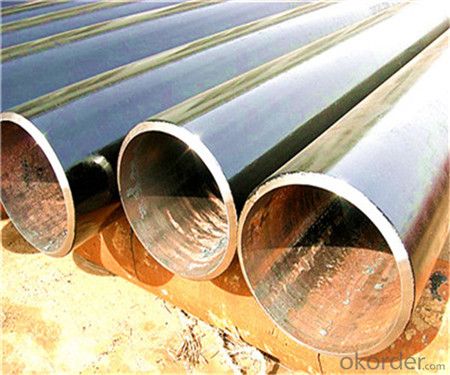
- Q:Are steel pipes suitable for underground compressed air systems?
- Generally, steel pipes are suitable for underground compressed air systems. They are a popular choice due to several advantages they possess. First and foremost, steel pipes are renowned for their strength and durability. This enables them to withstand the pressure and stress associated with compressed air systems. They can handle high operating pressures without the risk of bursting or leaking. Secondly, steel pipes exhibit excellent resistance to corrosion. They can endure exposure to moisture, soil, and other elements found underground. This reliability makes them ideal for underground installations where pipes may encounter potentially corrosive substances. Moreover, steel pipes are relatively easy to install and maintain. They can be securely connected through welding or threading, ensuring a leak-free connection. Additionally, inspecting and repairing steel pipes is a simple process, allowing for cost-effective maintenance and repairs. Nevertheless, it is important to consider other factors that may impact the suitability of steel pipes for underground compressed air systems, such as specific requirements and conditions. Consulting a professional engineer or qualified expert is advisable to determine the most appropriate choice for a particular application.
- Q:Can seamless steel pipe and ordinary steel pipe be welded?
- If your project is a seamless steel pipe, so theoretically, you put the tube with connected is not used.But the actual engineering operation, design drawings will be put on the normal need to improve the requirements of the drawings to the actual requirements, so if is the need of seamless steel pipe, welded pipe in the end so can you see yourself.
- Q:What are the different methods of transporting steel pipes?
- The different methods of transporting steel pipes include using trucks, trains, ships, and pipelines. Trucks are commonly used for short-distance transportation, while trains and ships are used for long-distance transportation. In some cases, steel pipes can also be transported through pipelines, especially for oil and gas applications. Each method has its own advantages and considerations, such as cost, capacity, and accessibility.
- Q:How are steel pipes used in the manufacturing of sewage treatment plants?
- Steel pipes are used in the manufacturing of sewage treatment plants for various purposes, including the transportation of wastewater, the distribution of chemicals and additives, and the construction of various components such as tanks, pumps, and pipelines. Steel pipes are preferred due to their strength, durability, and resistance to corrosion, ensuring reliable and long-lasting infrastructure for the efficient operation of sewage treatment plants.
- Q:What are the different types of steel pipe fittings for plumbing systems?
- There are several types of steel pipe fittings commonly used in plumbing systems, including elbows, tees, couplings, unions, caps, and plugs. Each of these fittings serves a specific purpose in connecting and directing the flow of water or other fluids within the plumbing system.
- Q:Can steel pipes be used for architectural purposes?
- Yes, steel pipes can be used for architectural purposes. Steel pipes offer various advantages such as durability, strength, and versatility, making them suitable for architectural applications. They can be utilized in constructing building frames, staircases, handrails, and other structural elements. Additionally, steel pipes can be aesthetically pleasing when employed in modern and industrial designs, making them a popular choice for architectural purposes.
- Q:Can steel pipes be used for high-pressure applications?
- Yes, steel pipes can be used for high-pressure applications. Steel is known for its strength and resilience, making it a suitable material for handling high-pressure fluids or gases. Additionally, steel pipes can withstand extreme temperatures and are resistant to corrosion, further enhancing their suitability for high-pressure applications.
- Q:How to make the magnetic steel, can be like a magnet?
- Magnetization. Winding the insulated wire on the object, passing in the direct current, and taking it down after a period of time.
- Q:How to perform nondestructive inspection of steel tubes
- Radiographic inspection (RT)One of the earliest nondestructive testing methods is widely used in the inspection of internal defects of metals and non-metallic materials and products, with a history of at least 50 years. It has incomparable unique advantages, that is to test the correctness, reliability and intuition of the defects, and the ray film can be used for the analysis of defects and as a quality certificate archive. But this method also has the disadvantages of more complicated equipment and higher cost, and should pay attention to the protection of radiation.
- Q:How are steel pipes used in the manufacturing of offshore wind turbines?
- Steel pipes are used in the manufacturing of offshore wind turbines for various purposes such as supporting the turbine structure, housing electrical cables, and transporting fluids like hydraulic oil and cooling water. These pipes provide structural strength, corrosion resistance, and durability, ensuring the stability and functionality of the turbines in the harsh offshore environment.
1. Manufacturer Overview |
|
|---|---|
| Location | |
| Year Established | |
| Annual Output Value | |
| Main Markets | |
| Company Certifications | |
2. Manufacturer Certificates |
|
|---|---|
| a) Certification Name | |
| Range | |
| Reference | |
| Validity Period | |
3. Manufacturer Capability |
|
|---|---|
| a)Trade Capacity | |
| Nearest Port | |
| Export Percentage | |
| No.of Employees in Trade Department | |
| Language Spoken: | |
| b)Factory Information | |
| Factory Size: | |
| No. of Production Lines | |
| Contract Manufacturing | |
| Product Price Range | |
Send your message to us
Seamless Steel Pipe for Oil Casing Tube factory
- Loading Port:
- China Main Port
- Payment Terms:
- TT or LC
- Min Order Qty:
- 25 m.t.
- Supply Capability:
- 8000 m.t./month
OKorder Service Pledge
OKorder Financial Service
Similar products
New products
Hot products
Hot Searches
Related keywords
